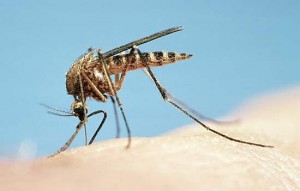 As we enter full-fledged summer here in Ithaca, my family is spending more and more time outside. While we love the sunshine and fresh air, we do not love the mosquitoes that come along with our outdoor adventures. My two-year-old son and I both have more severe reactions than most people – sizeable, itchy welts that last for several days.
As we enter full-fledged summer here in Ithaca, my family is spending more and more time outside. While we love the sunshine and fresh air, we do not love the mosquitoes that come along with our outdoor adventures. My two-year-old son and I both have more severe reactions than most people – sizeable, itchy welts that last for several days.
Since I’m already fed up with the bites (and summer has really just begun), I went searching for an evidence-based solution to our problem. What is the best way to prevent mosquito bites?
What I found put our own itchiness into perspective. There is an ever-growing body of research on mosquito-bite prevention that has nothing to do with our summer annoyances. In many parts of the world, preventing mosquito bites is a life-or-death issue because mosquitoes carry infectious diseases – most commonly malaria.
The first piece of evidence I came across is one prevent technique that clearly doesn’t work: electronic mosquito repellents that supposedly repel mosquitoes by emitting high-pitched sounds. Other non-chemical repellants such as citronella work moderately well, according to a review of the academic literature on the subject.
The chemical N, N-diethyl-m-toluamide, or DEET, appears to be the best way to ward off mosquitos, according to the evidence. Developed by the U.S. Army for use after World War II, it became available to civilians in 1957.
In more recent years, there have been concerns about the safety of DEET because it has lead to neurological problems such as seizures in some people. But a complete review of the evidence by the U.S. Center for Disease Control found that using DEET following the proper guidelines is safe and does help prevent mosquito bites. They’ve developed a great fact sheet that summarizes all of the evidence. And you can find even more evidence about insect repellents here.
So it’s bug spray for our family this summer, in moderation of course.



[…] written before about proven methods to avoid mosquito bites. Last week, the New York Times reported on a new method that avoids bug repellents and bites: […]